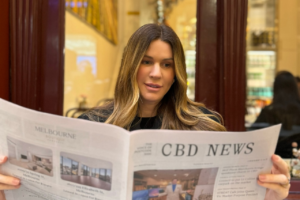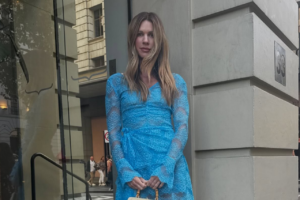In the sun-drenched landscape of Australian fashion, where surf culture meets luxury aesthetics, the story of Triangle Bikinis emerges as a masterclass in authentic brand building. What began as a conversation on Melbourne’s coastline would evolve into a global phenomenon, demonstrating how genuine connection and innovative design can triumph over traditional marketing paradigms.
The genesis of Triangle speaks to a universal truth in entrepreneurship: the most compelling businesses often arise from personal necessity. Standing in a boutique before a second date at the beach, Erin found herself in the familiar predicament of many women—caught between the casual functionality of surf wear and the aspirational pricing of luxury labels. This moment of frustration, shared later with her co-founder Craig, would catalyze a revolution in swimwear that prioritized both aesthetics and accessibility.
“When you’re buying something as intimate as swimwear, you want to feel like you can ask someone about sizing straight away,” Erin reflects, highlighting the brand’s early adoption of live chat—a feature that would become standard in luxury e-commerce. This instinct for human connection would prove prescient, setting the foundation for Triangle’s distinctive approach to growth.

The brand’s trajectory challenges conventional wisdom about influencer marketing in the digital age. While many contemporary brands chase paid partnerships and manufactured moments, Triangle’s strategy emerged organically from a philosophy of genuine relationship building. Their approach to gifting was revolutionary in its simplicity: they sent products with no strings attached, explicitly stating they expected nothing in return. This authentic gesture resonated deeply within the fashion community, eventually catching the attention of industry titans like Kendall Jenner and the Kardashians—not through aggressive outreach, but through genuine word-of-mouth among their inner circle.
Perhaps most telling was Triangle’s response to imitation. When faced with copying from both their manufacturer in China and global fashion giants like Victoria’s Secret, they chose innovation over litigation. “What we have to do as a brand is innovate, keep pushing forward,” Erin explains. “Know that we created that—they don’t have the talent to keep creating because they’re copying, so let’s keep creating.” This philosophy transformed a potential crisis into a catalyst for continuous innovation.
The brand’s commitment to authenticity extended to their operational model. In an era of rapid scaling and bloated organizational structures, Triangle maintained a remarkably lean operation even as revenues soared to $60 million annually. This approach wasn’t merely about efficiency; it reflected a deeper understanding that maintaining intimate customer connections required staying true to their foundational values.
Their journey from Melbourne to Monaco, from startup to global success, offers a compelling counternarrative to the conventional startup playbook. While many brands rush to secure venture capital and expand their team, Triangle demonstrated that sustainable growth could emerge from a foundation of authentic connection and continuous innovation.
For modern entrepreneurs, Triangle’s story illuminates a path forward that doesn’t require choosing between scale and soul. Their success suggests that in an age of digital saturation and manufactured influence, authentic connection remains the most powerful currency in brand building. It’s a reminder that sometimes the most sophisticated strategy is simply staying true to your founding vision while maintaining the courage to continuously innovate.

As we navigate an increasingly digital future, Triangle’s journey offers a timeless lesson: true brand resonance comes not from chasing trends or courting influence, but from maintaining genuine connections and constantly pushing the boundaries of innovation. In the end, their story suggests that the most sustainable path to growth might just be the most authentic one.
In an era where influence is often purchased rather than earned, Triangle Bikinis crafted a different narrative—one that would redefine how fashion brands approach celebrity endorsements and customer relationships. Their story offers a masterclass in authentic brand building, demonstrating how genuine connections can trump traditional marketing strategies in the digital age.
At the heart of Triangle’s approach lay a revolutionary concept: the zero-expectation gift. In 2014, when most brands were frantically negotiating paid posts and mandatory mentions, Triangle took the unprecedented step of sending products to influencers with explicit instructions not to feel obligated to post about them. “We were very clear,” Erin recalls. “We would say we’re sending you this, please don’t post unless you want to.” This counterintuitive strategy achieved what million-dollar marketing campaigns often fail to deliver: authentic advocacy from genuine brand enthusiasts.
The brand’s path to securing Kendall Jenner as an ambassador reads like a masterclass in relationship building. Rather than attempting to reach the supermodel directly, Triangle identified and nurtured relationships with her inner circle—including then-unknown friends Bella Hadid and Hailey Baldwin (now Bieber). This organic approach created a natural pathway to Jenner, who eventually reached out herself after seeing the products on her friends. The resulting endorsements felt genuine because they were—a quality that resonated deeply with consumers growing increasingly skeptical of manufactured influence.
Triangle’s commitment to authenticity extended beyond celebrity relationships to the very foundation of their customer service. In an industry first, they integrated live chat into their e-commerce platform, recognizing that purchasing swimwear online requires a level of trust and personal attention that automated responses cannot provide. “When you’re buying something as intimate as swimwear,” Erin explains, “you want to feel like you can ask someone about sizing straight away.” This innovation in customer service became a cornerstone of their brand experience, setting a new standard for online fashion retail.
Perhaps most remarkably, Triangle maintained this personal touch even as their operation scaled to $60 million in annual revenue. While conventional wisdom might suggest building expansive teams and complex systems to handle such growth, Triangle remained steadfastly lean. Their customer service team operated remotely from the Philippines, working from home while maintaining the brand’s signature personal connection with customers. This approach proved that authenticity could scale without sacrificing intimacy.
The Kardashian effect on Triangle’s growth provides a fascinating case study in organic influence. While many brands pay substantial sums for Kardashian endorsements, Triangle’s products found their way into the family’s wardrobe through genuine interest. Kim Kardashian’s selection of black, white, and grey pieces during the early Kanye era—dubbed “the Kanye effect” by the team—demonstrated how authentic brand adoption could transcend traditional marketing boundaries.
In today’s landscape, where consumers are increasingly adept at distinguishing genuine recommendations from paid promotions, Triangle’s approach offers valuable lessons for modern brands:
First, authenticity cannot be manufactured—it must be cultivated through genuine relationships and consistent actions. Second, the most powerful endorsements often come not from direct outreach to major influencers, but through organic network effects built on genuine product appreciation. Finally, maintaining a personal touch at scale requires innovative thinking about organizational structure and customer service delivery.
As we move deeper into an era where digital authenticity becomes increasingly precious, Triangle’s story reminds us that true brand building isn’t about chasing influencers or manufacturing moments—it’s about creating genuine connections and letting word of mouth work its natural magic. Their success suggests that in the attention economy, authenticity might be the most valuable currency of all.

In the glittering narrative of entrepreneurial success, certain chapters often remain unwritten—the profound personal challenges that accompany rapid scaling, sudden wealth, and the complex journey of maintaining one’s sense of self amid transformative success. Erin’s story with Triangle Bikinis illuminates these hidden dimensions, offering a candid exploration of growth that extends far beyond business metrics.
At 27, when most professionals are still finding their footing, Erin found herself at the helm of a rapidly expanding global brand. The years between 2011 and 2018 weren’t just about building Triangle; they were formative years of personal development that became inextricably linked with the company’s identity. “They’re really formative years of working out who you are,” Erin reflects, “and I was Triangle—that was me, that was my identity.”
The transition from entrepreneur to global success story brought with it a particular kind of isolation. By 2015, Triangle had achieved what many founders dream of: multi-million dollar revenues, celebrity endorsements, and a coveted spot on the Young Rich List. Yet beneath this veneer of success, Erin grappled with a growing disconnect between external achievements and internal fulfillment. Each year, she requested to be omitted from the Rich List—not out of modesty, but from a deep-seated unease with a narrative that felt increasingly disconnected from her personal reality.
This dissonance reached its peak during their time in Monaco, where material success collided with personal questioning. “I just wasn’t feeling as happy as I thought that I probably should be feeling,” she recalls. The experience taught her what she considers the most valuable lesson from Triangle: “It does not matter what your material successes are if inside just isn’t working.” This insight, earned through experience rather than explanation, challenges prevailing narratives about entrepreneurial success.
The journey of self-discovery intensified after her exit in 2018. “When I exited in 2018, I did not know who Aaron was,” she admits. The process of rediscovering herself required something that seems antithetical to entrepreneurial instincts: stepping back completely. Taking four years away from business became not just a pause but a crucial period of reconstruction—an opportunity to separate personal identity from professional achievement.
First, the importance of maintaining personal development alongside business growth. The years spent building a brand are also formative years of personal growth—one shouldn’t come at the expense of the other. Second, the recognition that external success markers—whether revenue figures or media recognition—don’t automatically translate to internal fulfillment. Finally, the courage required to step away and rebuild when success begins to overshadow personal identity.
Today, Erin approaches her next chapter with hard-won wisdom. Her focus has shifted to helping other women in business navigate their own journeys, armed with the understanding that true success encompasses both professional achievement and personal fulfillment. “I know that I’m coming from a base of knowing me and knowing what fills me up and what makes me happy,” she explains, highlighting how personal growth has transformed her approach to business.
The most powerful lesson from Triangle’s story might not be about building a successful brand but about maintaining one’s sense of self through the process. In an era where entrepreneurial success is often measured in exits and valuations, Erin’s journey reminds us that the most important metrics might be internal ones—how well we know ourselves, how authentically we live, and how we maintain our personal truth amid professional triumph.
For the next generation of entrepreneurs, this narrative offers a crucial counterpoint to traditional success stories. It suggests that the real art of business building lies not just in scaling operations or driving revenue, but in growing personally alongside your venture—maintaining your sense of self even as your business transforms into something bigger than you imagined.
In an era where digital storefronts multiply daily and algorithms increasingly mediate consumer relationships, Triangle Bikinis’ journey offers prescient insights into the enduring value of human connection in e-commerce. Their story, particularly relevant as we navigate the complex digital landscape of 2024, demonstrates how authentic relationship building can transcend the limitations of traditional online retail.
When Triangle pioneered live chat in fashion e-commerce, they weren’t just adding a feature—they were challenging fundamental assumptions about how intimate purchases could be facilitated online. “When you’re buying something as intimate as swimwear,” Erin notes, “you want to feel like you can ask someone about sizing straight away.” This insight, revolutionary at the time, has become increasingly relevant as consumers seek personalized experiences in an increasingly automated world.
The evolution of influencer marketing, as illustrated through Triangle’s experience, provides a compelling framework for modern brands. Their approach—gifting products with explicitly no expectations—stands in stark contrast to today’s often transactional influencer relationships. “We were very clear,” Erin recalls. “We would say we’re sending you this, please don’t post unless you want to.” This strategy, which yielded organic endorsements from figures like Kendall Jenner and the Kardashians, offers valuable lessons for contemporary brands navigating the increasingly saturated influencer landscape.
In 2024, as brands grapple with rising customer acquisition costs and diminishing returns from traditional digital marketing, Triangle’s emphasis on word-of-mouth resonates with particular clarity. “People still underestimate word of mouth because it’s not like a measurable thing,” Erin observes. “You can’t say ‘Oh, here look, here’s the return on investment on word of mouth,’ but it’s so valuable.”
First, the power of intention in brand building. Erin emphasizes that successful brands must have “the right intention when starting a business.” This goes beyond mere profit motivation to encompass a genuine desire to solve customer problems and create value. In an age where consumers are increasingly adept at detecting authenticity, this fundamental alignment becomes crucial.
Second, the enduring value of customer nurturing. While many contemporary brands focus on acquisition metrics, Triangle’s success stemmed from treating customers “like they are king.” This philosophy, combined with their innovative approach to customer service, created a loyal customer base that drove organic growth through recommendation.
The balance between automation and personal touch remains a critical consideration for modern e-commerce. Triangle’s model—using remote customer service representatives working from home in the Philippines—demonstrates how brands can scale personal connection without losing authenticity. This hybrid approach, combining technological efficiency with human warmth, offers a template for brands seeking to maintain intimacy at scale.
For brands entering the market in 2024, Triangle’s journey suggests several strategic priorities:
- Prioritize authentic connection over transactional relationships with influencers
- Invest in systems that facilitate genuine human interaction, even as operations scale
- Focus on creating shareable experiences that drive organic word-of-mouth
- Maintain clear brand intentions that resonate with contemporary values
The digital landscape continues to evolve, with new platforms and technologies emerging regularly. However, Triangle’s experience suggests that beneath these surface changes, the fundamentals of human connection remain constant. Their success demonstrates that in e-commerce, as in traditional retail, the most powerful marketing tool remains the genuine enthusiasm of satisfied customers.
As we look toward the future of e-commerce, Triangle’s story reminds us that while technology enables connection, it’s authentic human relationships that drive sustained success. In an increasingly digital world, their approach suggests that the brands that will thrive are those that master the art of using technology to enhance rather than replace human connection.


